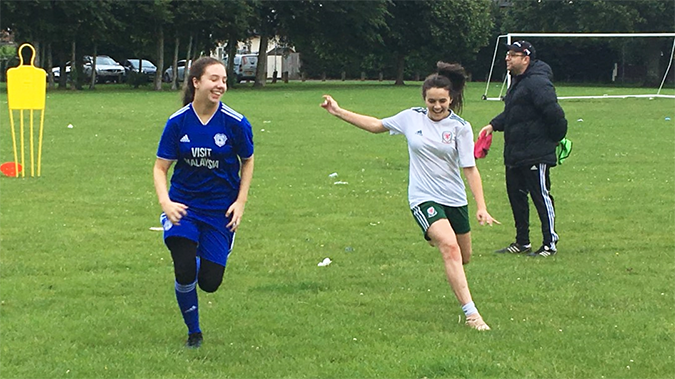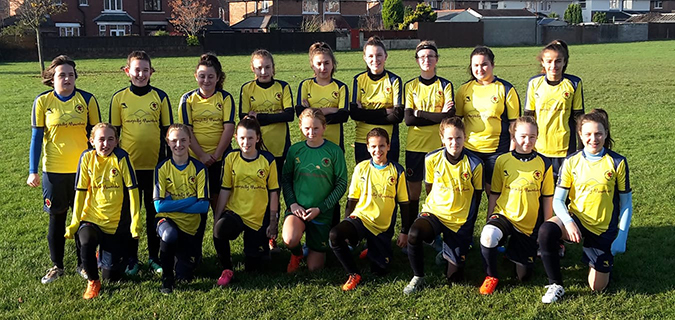Over 6,000 girls are now playing for football clubs in Wales, but are girls-only teams helping these young women to thrive?
It’s five minutes before the Under 14s training starts at Thornhill Girls FC, but a small group of players are already out on the pitch. They shout their encouragements to Ffion, who’s attempting to break the current keepie-uppie record of fifteen in a row.
“Twelve, thirteen, fourt…” they count. She misses the ball in mid-air. “Unlucky, Ffion!”
It’s Nia’s first training at an all-girls club. Dragging her feet against the grass, she walks over just as another girl, Jess, lines up to break the record. Jess is much quicker than the rest, spinning around to hit the ball from every angle; the rest of the team lose count of how many times she’s kept the ball up.
“She’s done about thirty now, I swear!” says Ffion. Nia’s still watching from the sidelines, eyes wide. This girl is good. Really good.
Just as Jess lets the ball drop, Ffion spots Nia standing just outside the circle. “Fancy a go?” she says. Nia smiles, before joining her new teammates in the circle, ready to give it her all.
Having played for boys’ teams since the age of nine, coming to Thornhill Girls was a big change for thirteen year-old Nia from Cardiff. Feeling uncomfortable in an environment of mostly teenage boys, she felt that this was a move she had to make. “By the time I turned thirteen, the boys we played with were a lot bigger than me, so it became a lot harder to play against them.” she says.
It’s quite scary to play with the boys if you’re more shy or less confident in your abilities.
Nia, Thornhill Girls
More and more young girls in Wales are taking up football, with a FAW report showing a 17% increase in female participation in 2018. The Football Association of Wales (FAW) Trust’s Head of Player Development, Caroline Spanton has said that we’re living in a very positive time for girls’ football, with over 80 accredited girls football clubs in the country.
Although the girls’ game is seeing a lot of growth, The FAW are working hard to ensure more opportunities for girls’ football in Wales. They launched their new Huddle programme this year, in which they create new environments for female players to thrive, as well as a seamless pathway of development for girls, starting at grassroot level right up to the national squad.

While girls like Nia enjoy playing in all-girls teams, a recent FIFA report revealed the advantages of mixed-sex football teams, such as improving tolerance and promoting mutual respect. Some female players feel that young girls might be missing out as a result of same-sex teams. “I preferred playing with the boys when I was younger,” says Jo, who plays for Cardiff Bluebelles. “If you’re serious about football, it stands you in good stead to play with the boys, because they toughen you up a bit more and make you stronger than other girls your age.”
However, the reality of being ‘toughened up’ by the boys at mixed football clubs can sometimes be less advantageous than Jo suggests. “The boys at my old club didn’t like having a girl on their team,” says Nia. “I heard one boy ask, ‘What’s that girl doing here?’ when I arrived at my first training. Playing with them made me feel uncomfortable sometimes because the boys were a lot more aggressive than me on the pitch.”
Although FIFA believes that by playing alongside boys, girls can increase their self-confidence, this isn’t always the case. A 2017 Women in Sport report found that boys enjoyed the competitive side of sport 20% more than girls their age, and might be one reason young girls feel uncomfortable on boys’ teams.
This competitive nature stems from confidence, according to a 2017 Ifo Institute study. As girls get older, their self-esteem levels drop, which means they’re less likely to approach a sport with a competitive attitude. Boys, on the other hand, maintain this level of self-confidence well into their 20s, which only boosts their competitiveness. “When I played for a boys’ team, I realised that boys were a lot more competitive than girls,” says Arwen, who has just started her second season with Thornhill AFC. “Maybe they’re more confident because they’ve been encouraged to play football from an earlier age, but because I was more shy, it was really hard to get them to pass me the ball, or to get involved in the camaraderie.”

Perhaps one factor contributing to the lack of confidence in young girls at boys’ clubs is the lack of female coaches available as role models. Over 90% of coaches who hold UEFA licenses are men, with this ratio also being reflected at grassroots level. For young girls starting out in football, this hyper-masculine environment can sometimes be off-putting, with boys’ clubs feeling like hostile environments. “The coaches for the boys’ team were a lot stricter than the coaches here at Thornhill,” says Nia. “They could be a little bit more ‘shouty’ from time to time. When we played against teams without girls on them, their coaches were a lot meaner to their players, shouting criticism from the sidelines.”
A recent report revealed that men were twice as likely to be verbally aggressive than women in sports, especially in coaching roles. As this method of coaching proved to negatively affect children’s motivation and satisfaction, it’s possible that female coaches would provide young girls with a safer, more positive way of learning.
This is why the Football Association of Wales is calling out for more female coaches, aiming for a target of 600 by 2024, but for now, the field seems to be dominated by men. However, some male coaches for girls’ clubs are making sure that the self-confidence of their players is a top priority. “We make sure we challenge the girls, but in more positive, encouraging way,” says Mike Barkley, coach at Thornhill Girls. “We know maybe they won’t feel as confident as some boys their age are – but once they come to a few trainings, those nerves start to disappear.”
The FAW are recruiting both male and female coaches for the girls’ game, but are trying to encourage women specifically, to provide positive role models for aspiring female footballers.
Having female coaches at grassroots level is so important. The more women are seen in football, the fewer challenges there are for more young girls to be inspired to play, coach or support.
Katy Evans, FAW Trust
One-hundred percent of male athletes will have had a male coaching role model during their athletic careers, whereas young girls are not afforded the same benefit. As same-sex role models have been proven to positively influence young girls’ self-perceptions, it makes sense that many feel that girls-only teams, headed by female coaches are the way forward.
Whilst Nia decided to move to Thornhill Girls of her own accord, she would have eventually had to stop playing with the boys after turning fifteen, thanks to new FAW Guidelines. This can be frustrating for established players who feel comfortable playing alongside the boys. Hannah has been playing football for over fifteen years, and although she now plays for Cardiff Bluebelles Ladies, she first started out as the only girl on a boys’ team. “When I had to join a girls’ team at 15, I was quite annoyed,” she says. “I was a bit of a tomboy and thought I fit in well with the boys, so it took me a long time to settle in.”
Although Hannah was reluctant at first, the benefits of playing in a girls-only team became clear to her. “I did enjoy it more than playing with the boys, in the end.” she says. “You feel more like a team with the girls, whereas everyone at my old boys’ team was just competing to be the best.”
There are currently around 6,500 girls playing football in Wales – a figure which saw great improvements following the men’s team’s Euro 2016 journey, and by the women’s team’s World Cup qualifying matches. As part of their scheme to have 20,000 female players by 2024, the FAW is promoting girls-only teams as one way of attracting more girls to the game. “Currently, girls can play in a boys’ team until they’re 15,” says Katy Evans from FAW Grassroots. “This is a suitable provision for girls that are confident in a boys’ environment who are typically strong players. But, for the thousands of girls that have maybe dropped out of the game, girls-only provision from the foundation stages is a more suitable pathway.”

However, losing players can be very frustrating for the coaches of these boys’ teams, as by age 15, these girls have become key players for their clubs. Dean Ford is one of the coaches at Cogan Coronation FC, and has had a lot of trouble in attracting female players to his squad. As his club don’t currently have a girls-only team, recruiting female players is a constant challenge – one Dean feels is only made more difficult by FAW rules. “I personally find the FAW rule ridiculous,” says Dean Ford, coach at Cogan Coronation FC. “We have a girl in our squad who we’ll have to lose next season as we don’t have a girls team, which is so frustrating as she’s one of our star players.”
Although the FAW believes that girls-only teams are the key to female footballers’ success, perhaps allowing these girls to face off against the boys is the next step in boosting their confidence. SB Frankfort is an under-12s all-girls club that made history this summer after winning an all boys league – thought to have been the first time for a girls’ team to do so in Britain. Scoring an impressive 75 goals throughout the season, the girls had already won the league with two games left to play, having never lost a single match. “We have been told many times that girls can’t,” assistant coach John Preston told the Independent, “but this proves our girls definitely can.”
Although sex-segregated teams give young women the chance to develop, perhaps encouraging same-sex teams to compete against each other would be the next step for the FAW. “I think playing for girls only teams does help girls build confidence,” says Arwen. “But it’d be nice for us to play against boys’ teams so that we could show them how good we are.”
Keeping boys in boys-only teams doesn’t really help them see that we can play and that we could be on the same level.
Arwen, Thornhill Girls
For now, girls like Nia will have to make do with taking on other girls’ teams in the country, but she remains positive about the future. ““Ideally,” she says, “I’d like to be picked for the national squad by the time I turn fifteen or sixteen. If I keep training hard at Thornhill, who knows – it might just happen!”

